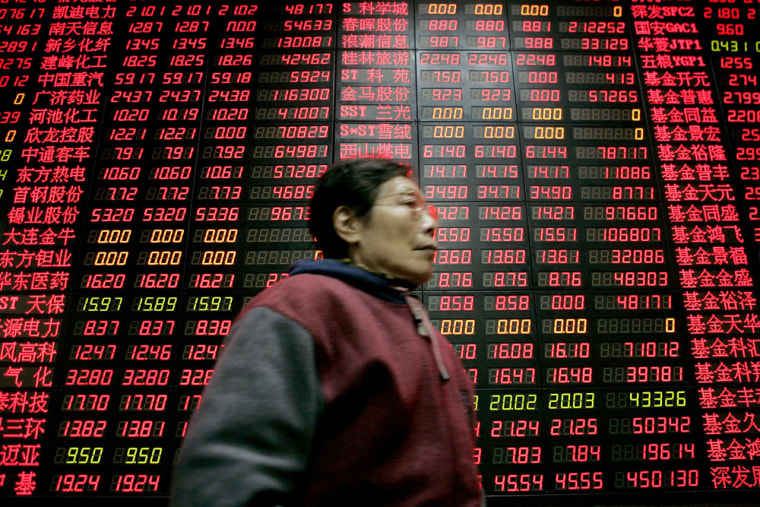European shares dropped sharply Wednesday while Asian shares rose in a volatile market mix as investors digested the U.S. Federal Reserve’s surprise interest rate cut aimed at shoring up the sagging American economy.
In Europe, the U.K.’s FTSE 100 dipped 3.7 percent to 5,528.7, while Germany’s DAX fell 5.4 percent to 6,401.29. France’s CAC slipped 4.2 percent to 4,614.04.
The FTSE and the CAC had finished in positive territory Tuesday after the rate cut, but analysts said market swings were expected to linger for some time because the Fed’s quick action between scheduled meetings was seen by some as a sign American authorities view the U.S. credit crunch as a very serious problem.
“The U.S. rate cut will not prevent the U.S. and world markets from slowing or even sliding into recession but it sends a positive signal that the Fed will do all it can do ... to halt the liquidity crunch that is paralyzing the financials sector,” said Lawrence Peterman, investment director at Eden Financial in London.
Markets may have taken their cue from a statement from European Central Bank President Jean-Claude Trichet that suggested he was sticking with his anti-inflation stance — and would not follow the Fed in cutting rates. Lower rates boost stocks.
Trichet said it was his duty to “solidly anchor inflation expectations to avoid additional volatility.”
Some analysts think, however, that the global market meltdown and a decelerating economy could finally shake the ECB’s steel nerves and see it cut interest rates as soon as the second quarter of this year.
In Hong Kong, the Hang Seng index surged 10.7 percent — its biggest gain 10 years — to 24,090.17, regaining much of the 13.7 percent it had shed over the previous two days.
Japan’s Nikkei 225 index rose 2 percent to close at 12,829.06 after tumbling 9.3 percent the previous two days, while India’s Sensex climbed 5.2 percent, recapturing nearly half its 12 percent losses from Monday and Tuesday.
In Shanghai, China’s benchmark index, which sank 12 percent earlier this week, bounced back 3.1 percent, and Australia’s market rebounded 4.4 percent, snapping a 12-day losing streak.
Fears of a U.S. recession, which would likely erode demand for Asian exports, has battered the region’s markets since the start of the year.
The sell-offs accelerated Monday and Tuesday amid skepticism that a stimulus package announced by President Bush on Friday would prevent the economy from contracting.
Jolted by worries of a global recession, the Fed on Tuesday slashed its federal funds rate three-quarters of a percentage point to 3.5 percent. It was the first time the Fed has changed rates between meetings since 2001, underscoring the sense of urgency.
On Wall Street Tuesday, the Dow Jones industrial average plunged more than 450 points initially but recouped most of its losses as the day progressed to close at 11,971.19, down 128.11 points, or 1.1 percent.
In the first minutes of trading Wednesday, the Dow Jones industrial average fell 261.10, or 2.18 percent, to 11,710.09.
Broader stock indicators also declined. The Standard & Poor’s 500 index fell 28.97, or 2.21 percent, to 1,281.53, and the Nasdaq composite index slid 53.19, or 2.32 percent, to 2,239.08.
Investors in Asia were already factoring in another U.S. rate cut of as much a half-point when the Fed holds its regular meeting on Jan. 29-30, traders said. But markets could slide back if Wall Street continues to decline in coming sessions, they warned.
In Hong Kong, where the benchmark index had plunged 22 percent since the start of the year through Tuesday, investors took heart from the U.S. rate cut and snapped up stocks that had fallen to attractive levels.
